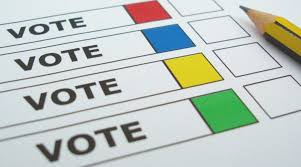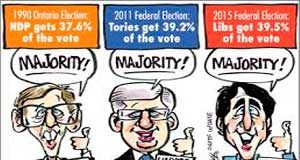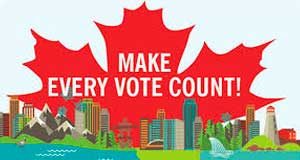Now that the federal Liberals have regained power and lost their zeal for democratic reform, it’s a really good time to restart the conversation. Because now we can be a bit more objective about [electoral reform] whether changing the way we choose our governments is a good idea.
Tired of all this blather about electoral reform? You’re not alone. Canadians have some weighty issues on their minds – like whether pipelines should get built, who will buy our softwood and how we’ll create more jobs. Oh, and what happened to the Stamps in the Grey Cup final?
Still, the Liberals have a promise to keep (or not). During the 2015 federal election campaign, Justin Trudeau vowed to replace the first-past-the-post system by 2019 and to introduce the necessary legislation by spring 2017. Once elected, he made a big deal out of it, appointing Maryam Monsef minister of Democratic Institutions and tasking her with coming up with a plan.
Like any good Liberal, Monsef managed to spend plenty of your money to create the House Special Committee on Electoral Reform, which took six months of work, toured the country and delivered a report that … goes nowhere. (Almost $9 million has been spent on electoral reform efforts in 2016 – $8 million allocated for the minister under the last federal budget and more than $670,000 for the committee’s study.)
Because, you see, there isn’t just one report. The 333-page “majority report” included the recommendation that a national referendum be held. It also suggested the method by which the government should design a new system. Unfortunately, several “supplemental” reports, including one from Liberal MPs, actually opposed the major recommendations.
Monsef told Parliament how disappointed she was by the committee, although a day later she explained that she didn’t mean to suggest that they hadn’t tried hard. So, we have a stalemate that Monsef cleverly proposes to resolve by spending more of your money to send postcards to Canadians asking them what they think.
Now you, poor taxpayer, may be feeling a bit agitated over how much time and money is going up in smoke over this issue.
Fear not – it’ll all be over soon enough. You see, the Liberals have figured out that this is yet another promise they can bail on.
Monsef says the government will not pursue major changes to the voting system without the broad support of Canadians. Recent polling suggests that most Canadians don’t give a flying fig.
A poll by Angus Reid Institute published on Nov. 29, conducted online with 1,516 respondents, found that about two-thirds saw changing Canada’s voting system as a low priority. Asked to choose between first-past-the-post and four alternative voting systems, respondents were largely split. As well, 43 per cent said they strongly or moderately favoured keeping the current system, 21 per cent said they didn’t care either way and 37 per cent moderately or strongly favoured change.
A poll like that tells you that if the Liberals want to ignore the squeaky wheels of change, a lot of Canadians aren’t going to have a big problem with that.
Which, ironically, is too bad. Lost in the conversation is the fundamental question of which electoral system best supports the imperfect goal of democracy. Remember, all this chatter about a fairer system started when people observed that very large minorities don’t have their voices adequately represented when a majority government – Liberal or Conservative – dominates Parliament.
The cry for reform began back when the Conservatives had the dominant majority. Now that the Grits are calling the shots, the voters on the right have every bit as much right to feel underrepresented as the progressives did before Trudeau’s coronation.
At the moment, ordinary Canadians have much bigger worries than electoral reform. By 2019, however, this issue will once again be the subject of national debate. And we’ll all wonder why nothing was done about it.
Monsef shouldn’t take the easy way out. Her committee should stop wasting money with meaningless postcard surveys and make the tough decisions on what electoral reform should look like. Then put it to Canadians in a referendum and let us decide how we’ll choose our next government.
— Doug Firby is a veteran political commentator and President of Troy Media Digital Solutions and Publisher of Troy Media.
© 2016 Distributed by Troy Media
More on electoral reform here
 TheBulletin.ca Journal of Downtown Toronto
TheBulletin.ca Journal of Downtown Toronto

